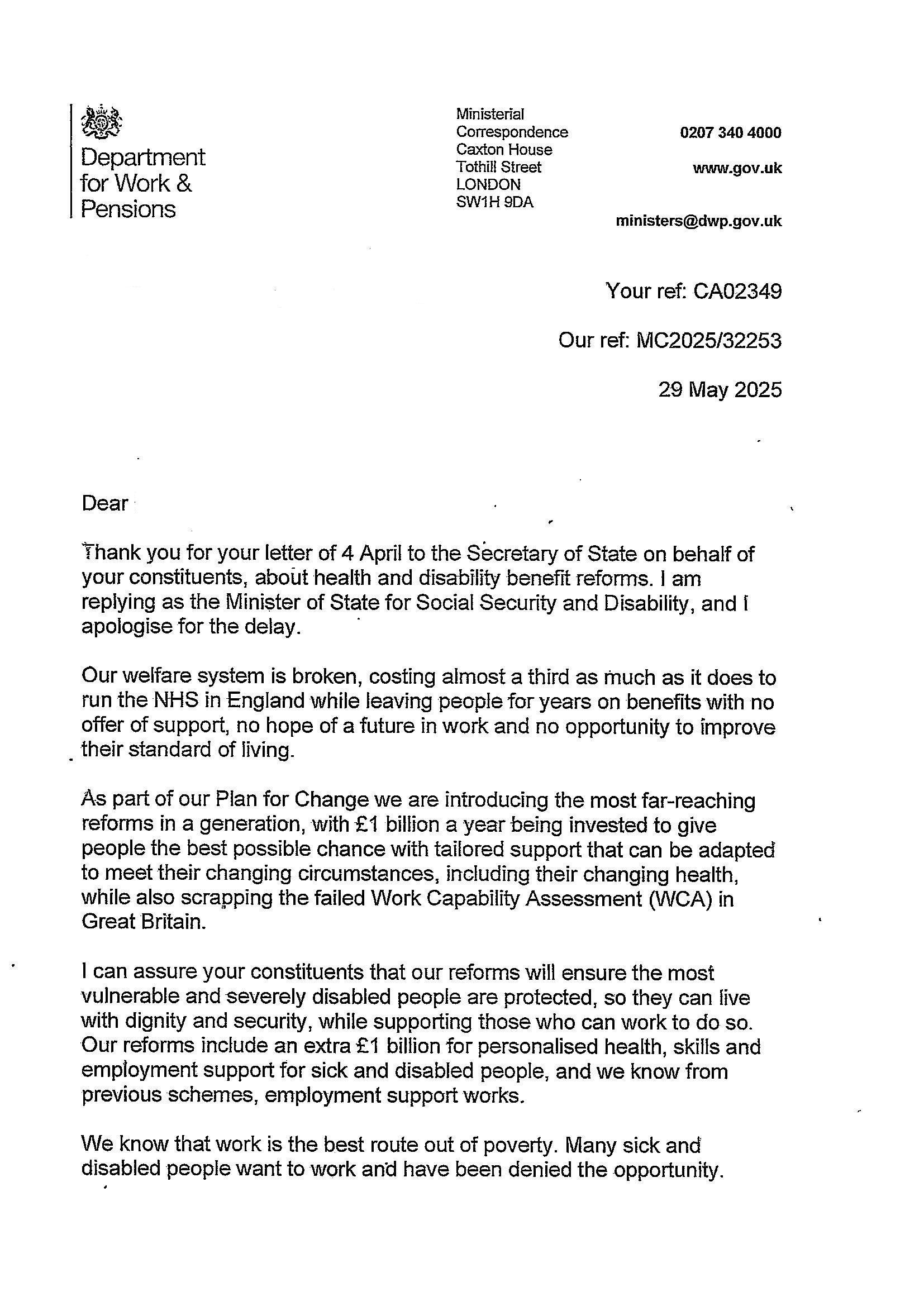Some Juicy Info

Hi everyone, sorry if I should have put this in another thread, but I wanted to get it to as many of you as pos…
Ok here goes… my MP got this letter from Timms the other day. It's a bit repetitive folks but gives some actual info and I've spotted a few big flaws in their arguments ( (see if you can spot any more)…
Points I have drawn from this letter (so far…):
- PIP changes will not begin to bite until November 2026 (not this year). So reports that changes will come in this November are wrong?
2. They are suggesting that no-one currently in receipt of PIP now will lose their entitlement when their next review comes along after Nov 2026, if their condition remains the same.
So are they saying that people won't lose their PIP if they don't get enough points under their new PIP plan?? I suspect that's wrong, but it's something we need to question them about.
3. They are suggesting that around half of all those assessed as LCW and / or LCWRA are actually fit for work. Where's the evidence?? The latest DWP stats show just 16% would be able to work:
The stats are from 2023 but they've not released any stats since.
Maybe Timms etc have just extrapolated numbers "fit for work" without any real evidence. And they don't appear to have taken into account the fact that huge numbers of us still cannot work while we are waiting for hospital treatment.
They have recently put out the idea that recognising a disability is "too easy" (quote by Streeting) and that doctors cannot be trusted to make a fair assessment…
4. They haven't produced any analysis on how many of those of us who will be "fit for work" and expected to look for work, will actually be able to get a job. They say £1 billion will be made available, but we all know what a mountain it is climb to persuade any employer to take on someone with a disability. You cannot force employers to do so.
At the same time they are increasing employers NI contributions for anyone earning as little as 5k, which will shut off many dead-end jobs that people like us would almost certainly end up doing.
Take a breath…
They will try to push these "reforms" through before there's any real scrutiny in Parliament. What we need to do is persuade enough MPs that they haven't thought this through, that their argument that many of us could work if given enough encouragement, and that we would actually get jobs at the end of it, is tosh.
Here's a good summary of their current thinking. This was in the Observer: Phil Collins has been right in the thick of the front bench behind the scenes for years:
This isn't about filling vacancies, he says quite clearly that anyone who's retired below retirement age and on a private pension, is fine as far as they are concerned. This is purely about saving money.
BUT they've not got it all their own way. They say over 170 Labour back benches are now revolting about these changes. So keep those emails going in folks! Labour, Libs, Greens, Independents, even some Tories are speaking out, unbelievably…
I've recently emailed Debbie Abrahams - she's the chair of the work + Pensions committee. Here's my email, feel free to copy + paste (I've cut out a bit that wouldn't be relevant to other MPs)…
Keep your spirits up everyone, this ain't over yet xxx
Comments
-
WELL done
0 -
Thank you very much for sharing @FeistyPigeon 😀
1 -
Thanks for sharing this, it’s really thought-provoking. I’m glad you posted it separately. In the other fast-moving Green Paper thread, important info like this would probably get missed or passed over. Seeing your email from Stephen Timms, giving us his own words instead of secondhand media interpretations, is refreshing. It will be interesting to see the response you get from Debbie Abrahams.
1 -
Hi @FeistyPigeon -
- Yes, there will be no proposed changes to PIP until Nov 2026. Tho as Timms says he is now currently looking at PIP assessments, criteria etc. & will work with disabled people & the organisations that support them. If that works out as to how we've been consulted so far, well that's not great.
2. No, there will be no change to a claimant's PIP award until their review or if they report a 'Change of circumstances' after Nov 2026, then their daily living component could change if these proposed measures occur. I believe he's just saying that no-one will lose the daily living component now, We are asked in the Green Paper about how any claimant should best be supported if they lose the daily living component with these proposed changes; the short answer is don't implement them in the first place, as PIP is about how a person's disablities affect them whether they're able to work or not.
3. This is also an interesting read:
4. Your comment about the increase in an employers National Insurance contributions is completely valid, something the Federation of Small Businesses voiced their opinion about: https://www.fsb.org.uk/media-centre/national-news/growth-gloom-means-government-must-urgently-produce-pro-small-business-plans-MC4JVS3XYE7RAXPL6IWIWC6HB6DU
So much about improving people's health; exactly how? How does tinkering with the PIP desriptors ensure better health (so we can work)? Fluctuating conditions are also incredibly difficult to manage, but the inference is, you too could work.
Throwing money at a problem doesn't solve people's disabilities, as we know, and it's been tried in the past, so I'm at a loss with this Govt's proposals.
Many of us are still fighting against these draconian measures. It is just a totally unneccessary cost cutting exercise at the expense of disabled people.
Another interesting read from the New Economics Foundation:
3 -
Thank you so much for laying this out so clearly, and for the helpful links. The way these proposed changes are being handled, especially under the guise of "consultation", feels incredibly disheartening when past experiences have shown little genuine listening or understanding.
I completely agree that if the government is truly concerned about health and work, they should be investing in proper support structures, not simply reshaping benefits with cost-cutting as the underlying motive. The idea of removing the daily living component for some is especially worrying. As you rightly said, if a Green Paper needs a section on how to soften that blow, perhaps the real issue lies with the policy itself.
Fluctuating conditions and complex disabilities cannot be boxed into narrow criteria. This feels less like meaningful reform and more like cost-cutting at the expense of those who most need support.
2 -
Hi MW1213, Late reply but thanks your comments - reassuring I did the right thing with this separate thread : ) Debbie Abrahams hasn't replied directly but she's really stuck her neck out for us now, most likely on Starmer's black list. Watched her during the Work and Pensions debate in the Commons day before yesterday and when the news broke on ITV that night - she was the one being interviewed about the rebellion + said the front bench had asked for it + their bill should be dropped. Plus she had another go on Channel 4 News last night, here in case you missed it:
Two important points she's flagged: 1. she's worried mental health problems and suicides will increase when the benefit cuts bite (and we know how much mental health services have been cut), and 2. (as I mentioned in my letter to her), it's a heck of a challenge for disabled people to get any sort of job. Several of them are now arguing it won't save any money as, kept in poverty + under constant stress, people will grow more sick + need more help. A very good argument I think.
I've written to my MP again (a liberal) + Steven Darling (their spokesman for the liberals). Will put the main points up in a thread when I've finished answering everyone. We need one more push, the debate is set for next Tues so we need to encourage as many MPs as pos to support Meg Hillier's amendment. Though I've no doubt even now Labour front bench are trying to do a deal with the Tories behind the scenes (they'd be defeated otherwise)…
0 -
Those are some very interesting refs you have there chiarieds, thanks very much : ) If there's time I'll get the main gists into another MP letter, maybe send it to Debbie Abrahams. I can well believe the report about PIP uptake. Years ago when the disability living allowance was replaced by PIP, under the Tories (what a surprise), they tightened the rules considerably by restricting the criteria you can apply under. I know I wouldn't qualify, even though I'm too disabled to do anything. And there must be loads of us in the same situation. And now under "Labour" they're killing it off even more… (but of course Starmerism is no more Labour than a brass monkey - with apologies to monkeys).
And the Bank stuff… Yep they certainly keep all that quiet, you never hear a word about QE or anything else to do with paying off the bank debt. And of course Reeves worked for years in the banking sector, they are her mates + they have her ear when it comes to policy. It's all pretty sickening when you think of the consequences and how many of us suffer as a result.
Yes good stuff chairieds, I'll get something sorted + maybe post it here if there's time. It all helps <thumbs / wings up>
1
Categories
- All Categories
- 15.7K Start here and say hello!
- 7.4K Coffee lounge
- 103 Games den
- 1.7K People power
- 149 Announcements and information
- 24.7K Talk about life
- 6K Everyday life
- 468 Current affairs
- 2.5K Families and carers
- 888 Education and skills
- 1.9K Work
- 555 Money and bills
- 3.7K Housing and independent living
- 1.1K Transport and travel
- 630 Relationships
- 1.5K Mental health and wellbeing
- 2.5K Talk about your impairment
- 873 Rare, invisible, and undiagnosed conditions
- 936 Neurological impairments and pain
- 2.2K Cerebral Palsy Network
- 1.2K Autism and neurodiversity
- 40.8K Talk about your benefits
- 6.1K Employment and Support Allowance (ESA)
- 20K PIP, DLA, ADP and AA
- 8.9K Universal Credit (UC)
- 5.9K Benefits and income






